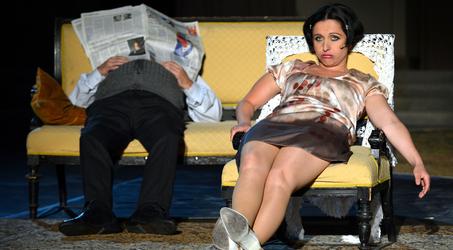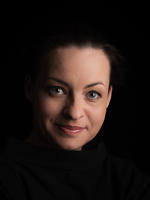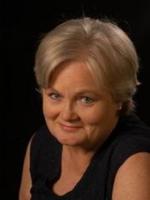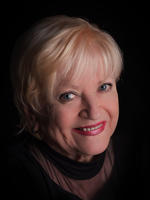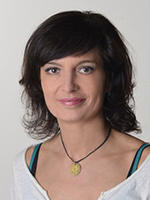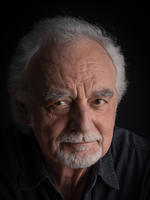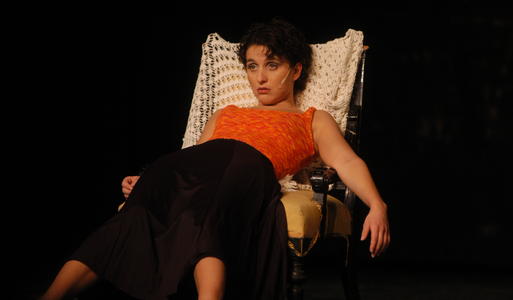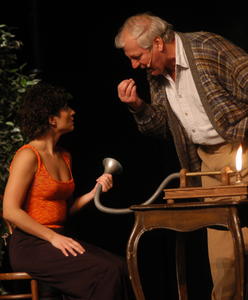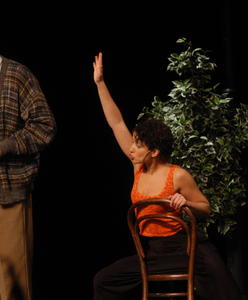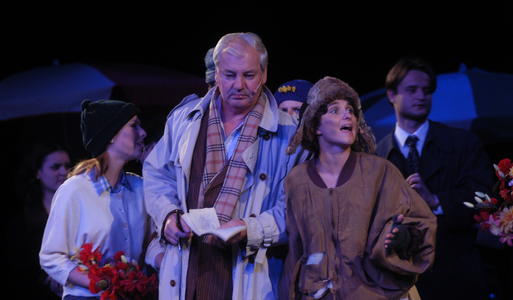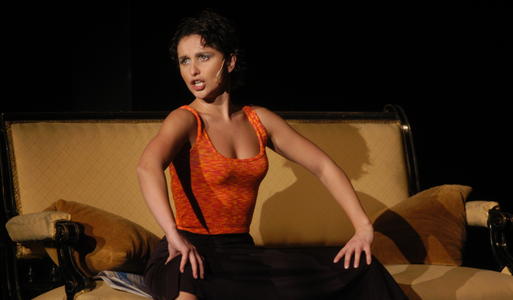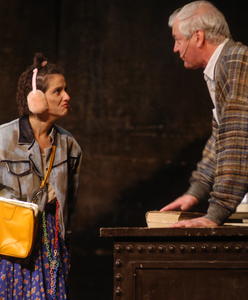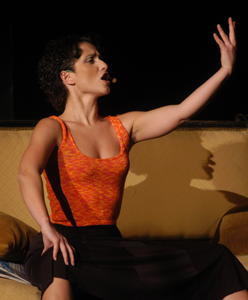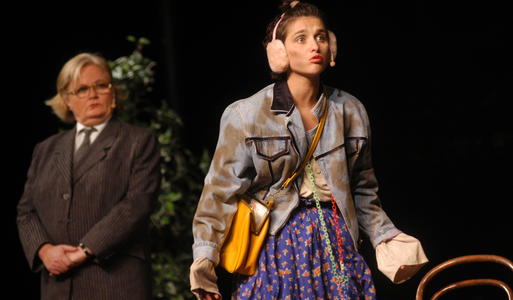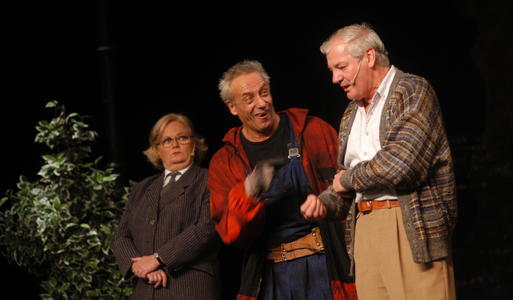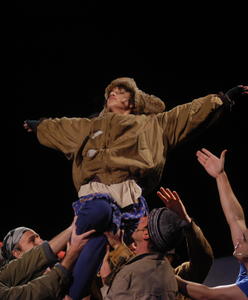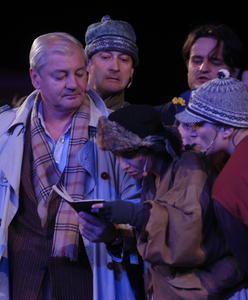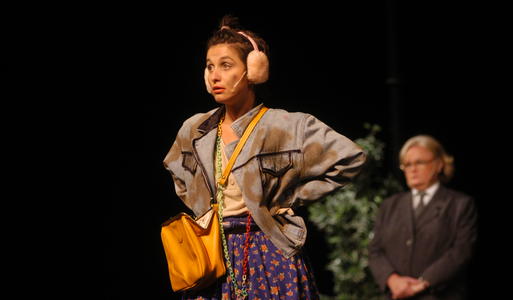Eliza Doolittle was getting rid of her Brno slang
Zdeněk Hejduk 1. February 2010 zdroj Kolínský deník
A lot of Brno slang could be heard from the stage of Kolín’s City Theatre on Friday night when the ensemble of Brno City Theatre performed their own adaptation of the world-famous novel Pygmalion by G.B. Shaw. The musical My Fair Lady has been produced with various adaptations all around the world - Brno director Stanislav Moša’s take on it used Brno’s famous slang and added an extra phrase to the title (‘from the Cabbage Market’). His heroine sells her flowers under Špilberk castle at the Cabbage Market, she has a slightly different name, and Jindřich Hradský, not professor Higgins, is trying to bring her up in the world for a bet.
This play, with its many dance numbers and songs known to everyone from many New Year’s Eve TV revues, and with a live band in the orchestra pit, became a great acting concert for Jitka Čvančarová. Her partner was Martin Havelka, who starred in the Prague musical Hair some time ago.
It was already possible during the break in this more than three-hour performance to speak (somewhat ahead of time) of the experience of the year. The auditorium was full up to the very last place and the spectators were rolling with laughter and clapping after every song and dance piece. The applause at the end went on for a long time. The main actress then got a bunch of roses from her current partner, who was watching the performance from the director’s loge box.
The Lady from the Vegetable Market...
Libuše Zbořilová 1. December -1 zdroj Rovnost
The Lady from the Vegetable Market Will Become a Hit
… Stanislav Moša has been already included in our leading musical directors, which is confirmed again in the Lady with an exact view from above and a perfect direction of actors (in double or triple cast) to exactly balanced characters including their transformation, to seamless connection of spoken, sung and danced sequences. Surprising scenes (the use of mirrors in a ball-room) and their resourceful lighting (scenery of the Vegetable Market) are used. The director is also lucky in casting the parts: Karel Jánský (prof. Hradský) reveals a hidden temperament of a spoil-sport scientist with a sensitive heart, leading his struggle with grasp and ease. Colonel Špička acted by Jiří Tomek has a large dimension of a man who understands everything around him, whose militarism did not blunt his good sense of humour but, on the contrary, helped him solve extraordinary situations. Tomek’s fine comic seconds Jánský’s coarse-grained performance very well. Líza Ďulínková performed by Markéta Sedláčková has a slightly exaggerated beginning but during her gradual transformation she is growing up to a balanced and sadly aware attitude in which Sedláčková utilizes her previous experience. Her father, Alfréd Ďulínek, is endowed with exact outlines of the figure and sings the most beautiful songs, which was completely used by Zdeněk Junák in his animal, likeable creation …
Moša Succeeded in My Fair Lady
Simona Polcarová 1. December -1 zdroj Jihomoravský den
…The director Stanislav Moša gets excellent for his adaptation of the famous musical My Fair Lady by Alan Jay Lerner and Frederick Loewe to the Brno environment …
…Eliza Doolittle was changed into Líza Ďulínková and the Brno “hantec” became her cloddish dialect. Her unbearable phrases pronounced on the Vegetable Market screeched in the ears of professor Jindřich Hradský, distinguished fonetician, who decided to make a duchess of her in half a year. The well-known motif got an incredible vim in a new rendering and fused with more than forty-year-old stuff quite naturally. The Brno dialect proved to be a suitable equivalent to badly articulated cockney English and, moreover, it was warmly accepted by the home audience. The successful adaptation (in co-operation with Marie Krčmová) should be highly appreciated as it penetrated not only to the spoken parts, but also to the famous songs …
…Moša’s direction irradiates spontaneity and lightness connected with masterful dancing in Vladimír Kloubek’s choreography. The director guides his actors sensitively and starts with certainty any situation of which fun or fine emotion may be extracted. His artfulness is apparent in the scene where the cream of Brno society is sitting at the table before a horse race with uneducated Líza. Awkward moments of silence, uncertainty and the endeavour to continue conversation interrupted by ill-mannered Líza bear a hallmark of real social faux pas experienced probably by each of you. Kloubek stages skilfully a clumsy dance of marketeers and vigorous father Ďulínek with his companions putting it in an enchanting contrast with a newly-acquired nobility of Líza floating gracefully among mirror walls and singing the song ‘I Could Have Danced All Night’ in the middle of night.
Last but not least, the quality of presentation is increased by outstanding actors. The company is so accomplished that no weaker chain link can be seen on the stage; nobody allows anything to be out of tune. Petra Jungmanová acting Líza is getting through a fantastic transformation from a dirty shrill siren to a self-confident young lady, mastering the change while singing and dancing without getting out of breath. Martin Havelka is successful in his part of conceited and settled old bachelor, Zdena Herfortová playing his mother does not lack necessary nonchalance and charm, the part of father Ďulínek is perfectly mastered by Zdeněk Junák, even as for singing, and this enumeration could be continued similarly ad infinitum …

